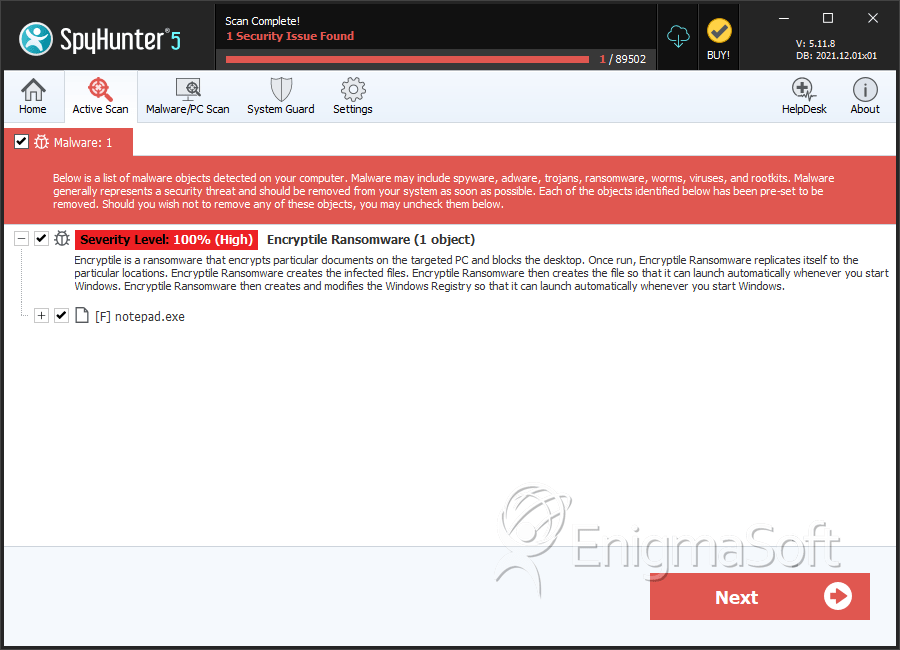Encryptile Ransomware
The Encryptile Ransomware is a ransomware Trojan that is used to force computer users to pay large amounts of money by taking their files hostage. The Encryptile Ransomware is unique in that it can demand its ransom payment in 34 different languages. The most common way of distributing the Encryptile Ransomware is by including it as a file attachment distributed in spam email messages. In most cases, the corrupted files associated with the Encryptile Ransomware are DOCX or PDF files that take advantage of vulnerabilities in the victim's computers to load corrupted code. Because of this, computer users should avoid opening unsolicited email attachments.
Table of Contents
How the Encryptile Ransomware Turns Your Files Unavailable
The files affected by the Encryptile Ransomware will no longer be readable. This is because the Encryptile Ransomware will have encrypted them. The files affected by the Encryptile Ransomware are recognizable immediately because their extensions will have been changed to '.the Encryptile' and their Windows icon will have changed. They also will no longer be able to load normally. The Encryptile Ransomware is designed to encrypt most commonly used file types, including images, text, video, documents, spreadsheets and database configurations. The Encryptile Ransomware will target the files that are smaller than 30MB in size specifically and can be especially destructive if the Encryptile Ransomware manages to infect a Web server.
After the Encryptile Ransomware finishes encrypting the victim's files, the Encryptile Ransomware will stop all third-party software on the victim's computer and display a ransom note. The Encryptile Ransomware's ransom note is delivered in the form of an HTA application that is named 'the Encryptile - [10 random characters].' This method for delivering ransom notes seems to have become a standard method since Fall of 2016 and has appeared as the most commonly used method among many new ransomware Trojans. However, the Encryptile Ransomware also will use the older method of delivering the ransom note in the form of a text file dropped on the victim's drives and by changing the victim's Desktop image to the ransom note. The following is the ransom note associated with the Encryptile Ransomware attack:
'If anti-virus stopped software, e-mail ID after you pay.
Your files are safely encrypted with strongest MS encryption and a private RSA key
Your important files are encrypted with a MS and RSA key, only for this computer. To unlock all of your files as if nothing ever happened, please send 0.053773 bitcoin to the bitcoin address by 3 days or both keys will be terminated and your files will be sold.
There are tutorials and links to popular bitcoin markets to help you buy bitcoin easier. There is video proof the password downloads after payment, and that the decryption is flawless and you can't recover/restore any files without the keys. Send the exact amount of bitcoin. Wait a few minutes and hit "Check payment". After payment, the keys will download and the MS key will appear. Then go to "Decrypt" and enter the MS key. Web browsers and basic programs are only allowed until you pay. We will decrypt 1 file. E-mail us with your ID and file.
Warning! If anti-virus deletes software then look at the screenshot and text documents. You can still get your files if you pay by the time. Any cracking attempts will result in a termination of both keys.
E-mail: deposithere@e-mail.ph
ID: [10 random characters]'
The Encryptile Ransomware Demands Its Payment in 34 Different Languages
It is clear that the creators of the Encryptile Ransomware are planning to carry out attacks all around the world. This is apparent from the fact that the Encryptile Ransomware demands its ransom in 34 different languages. Apart from its ransom note, the Encryptile Ransomware displays a countdown timer and a list of all the files that were encrypted. PC security analysts strongly advise computer users to avoid paying the Encryptile Ransomware's ransom, despite that it presents a lower harm than other active ransomware Trojans considerably.
SpyHunter Detects & Remove Encryptile Ransomware

File System Details
| # | File Name | MD5 |
Detections
Detections: The number of confirmed and suspected cases of a particular threat detected on
infected computers as reported by SpyHunter.
|
|---|---|---|---|
| 1. | notepad.exe | 00190d0b7180b395b4a4866a813b70e3 | 0 |


Submit Comment
Please DO NOT use this comment system for support or billing questions. For SpyHunter technical support requests, please contact our technical support team directly by opening a customer support ticket via your SpyHunter. For billing issues, please refer to our "Billing Questions or Problems?" page. For general inquiries (complaints, legal, press, marketing, copyright), visit our "Inquiries and Feedback" page.